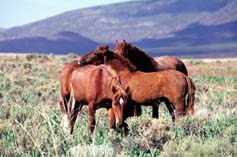Tucked into a Department of Agriculture funding bill signed into law in the middle of November was a provision for funding inspections of U.S. slaughterhouses that slaughter horses. This reversed a 2006 law eliminating funding for those inspections, therefore closing all of the horse slaughter operations in the U.S.
This didn’t mean that U.S. horses haven’t been slaughtered for meat in the past five years, notes an article in the Christian Science Monitor, which was among the first to have the story. It means that U.S. horses to be slaughtered for meat were shipped to Mexico and Canada first, the article says.
That journey is long and unpleasant, notes the People for the Ethical Treatment of Animals (PETA) — cruel, really. And while emphasizing that they support eliminating the slaughter of horses for meat everywhere, PETA has tenuously supported the refunding of inspections in the U.S., saying that it will reduce the cruelty of the horses being shipped for slaughter. (Read PETA’s blog statement here.)
The Los Angeles Times, while running the story a few days later, addressed the subtleties of PETA’s position. (Read the story here.)
The big issue, for wildlife managers, is that while privately-owned animals could be sent out of the country, the lack of inspection funding meant that there were fewer options for controlling populations of feral horses, which are a non-native species and can damage the habitats of native species. (See the feral horse position statement from The Wildlife Society, which is a four-page PDF.)
Only time will tell what this change of federal policy will mean for feral horses and native wildlife.
Photo: Healthy feral horses on a healthy range. Photo courtesy Bureau of Land Management (BLM)

